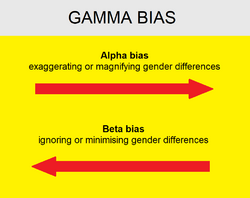Difference between revisions of "Gamma bias"
| Line 1: | Line 1: | ||
<b>Gamma bias</b> refers to a cognitive gender bias theory developed by Seager & Barry (2019).<ref>[https://link.springer.com/chapter/10.1007/978-3-030-04384-1_5 Seager, M., Barry, J.A. (2019). Cognitive Distortion in Thinking About Gender Issues: Gamma Bias and the Gender Distortion Matrix. In: Barry, J., Kingerlee, R., Seager, M., Sullivan, L. (eds) <i>The Palgrave Handbook of Male Psychology and Mental Health.</i> Palgrave Macmillan]</ref> |
<b>Gamma bias</b> refers to a cognitive gender bias theory developed by Seager & Barry (2019).<ref>[https://link.springer.com/chapter/10.1007/978-3-030-04384-1_5 Seager, M., Barry, J.A. (2019). Cognitive Distortion in Thinking About Gender Issues: Gamma Bias and the Gender Distortion Matrix. In: Barry, J., Kingerlee, R., Seager, M., Sullivan, L. (eds) <i>The Palgrave Handbook of Male Psychology and Mental Health.</i> Palgrave Macmillan]</ref> |
||
[[File:Gamma_bias.png|250px|thumb|Gamma bias]] |
[[File:Gamma_bias.png|250px|thumb|Gamma bias]] |
||
| − | + | Gamma bias entails the interrelation of two concurrent biases: alpha bias (exaggerating or magnifying gender differences) and beta bias (ignoring or minimizing gender differences). Gamma bias occurs when one gender difference is minimized while simultaneously another is magnified, resulting in a doubling of the resultant cognitive distortion.<ref>[https://www.centreformalepsychology.com/male-psychology-magazine-listings/can-we-discuss-gender-issues-rationally-yes-if-we-can-stop-gamma-bias John Barry & Martin Seager, Can we discuss gender issues rationally? Yes, if we can stop gamma bias]</ref> |
|
| + | |||
| ⚫ | The authors state that gamma bias often works to magnify women's issues and achievements and to minimize men's issues and achievements. Alternatively, the dynamic is reversed and employed to minimize negative female traits and behaviors, while magnifying or exaggerating any negative male traits or behaviors. |
||
| ⚫ | The authors state that |
||
| − | The gamma bias phenomenon can be conceptualised as a symmetrical 2*2 matrix of cognitive distortions, the gender distortion matrix. The matrix below describes examples of gamma bias, where perceptions of men and women are differentially magnified (capital letters underlined) or minimised (lower case letters in italics). |
||
==Further reading== |
==Further reading== |
||
Revision as of 11:15, 10 September 2022
Gamma bias refers to a cognitive gender bias theory developed by Seager & Barry (2019).[1]
Gamma bias entails the interrelation of two concurrent biases: alpha bias (exaggerating or magnifying gender differences) and beta bias (ignoring or minimizing gender differences). Gamma bias occurs when one gender difference is minimized while simultaneously another is magnified, resulting in a doubling of the resultant cognitive distortion.[2]
The authors state that gamma bias often works to magnify women's issues and achievements and to minimize men's issues and achievements. Alternatively, the dynamic is reversed and employed to minimize negative female traits and behaviors, while magnifying or exaggerating any negative male traits or behaviors.
Further reading
References
- ↑ Seager, M., Barry, J.A. (2019). Cognitive Distortion in Thinking About Gender Issues: Gamma Bias and the Gender Distortion Matrix. In: Barry, J., Kingerlee, R., Seager, M., Sullivan, L. (eds) The Palgrave Handbook of Male Psychology and Mental Health. Palgrave Macmillan
- ↑ John Barry & Martin Seager, Can we discuss gender issues rationally? Yes, if we can stop gamma bias
